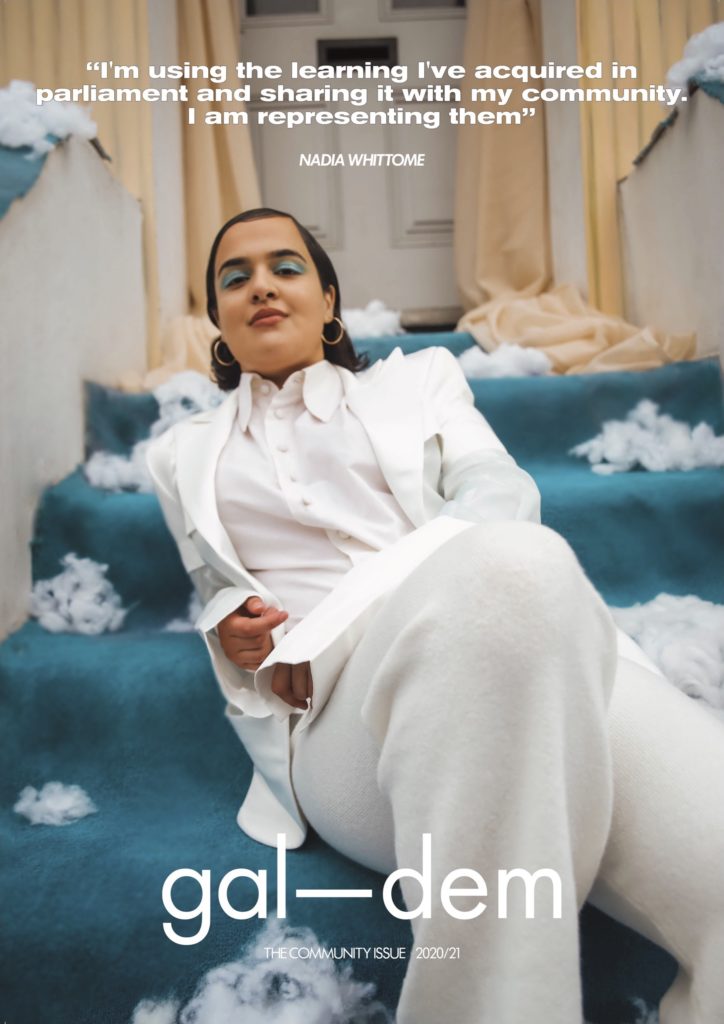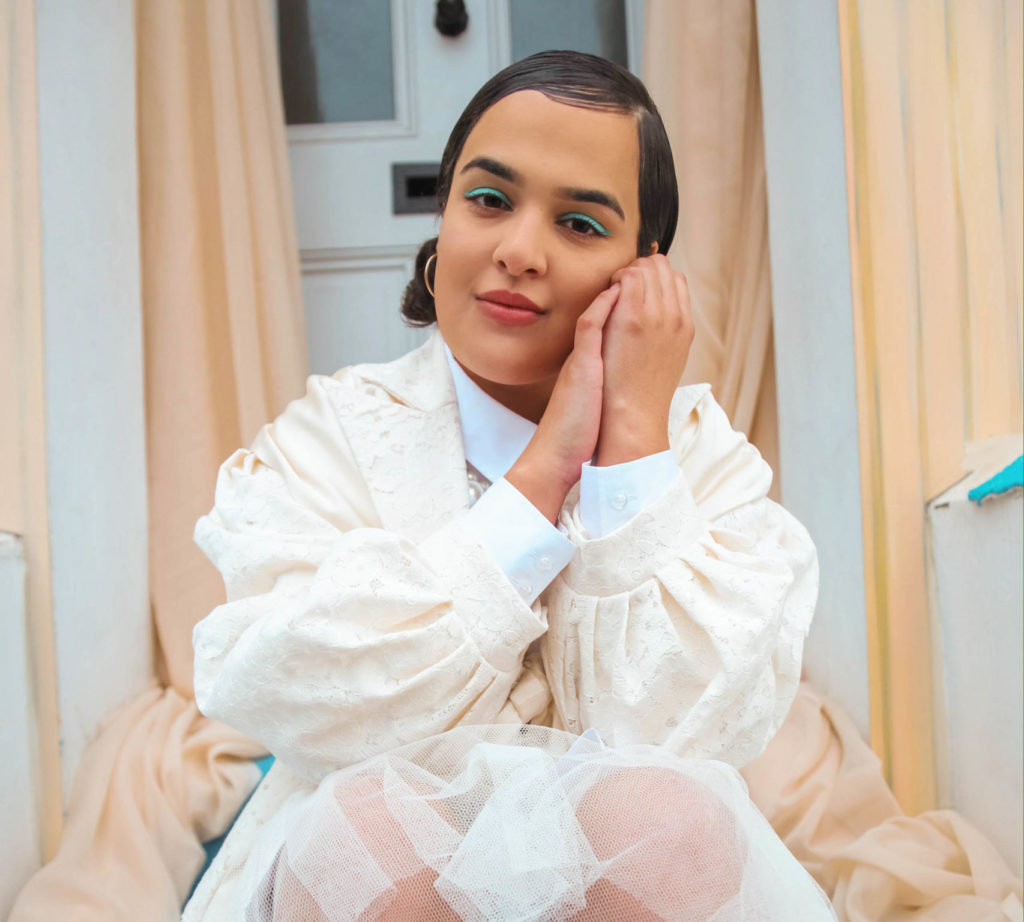
‘As people of colour, it’s important we don’t fracture’ – MP Nadia Whittome on community in the face of division
Moya Lothian McLean
10 Dec 2020
Before Nadia Whittome was a Labour MP, she was a community activist. In many ways, this is what she remains. From the very beginning of her service as the parliamentary representative for Nottingham East, the 24-year-old’s mission has been one shaped by collective effort – as gal-dem discovered the first time we interviewed her earlier this year. Even her victory speech on 12 December 2019 involved teamwork; unknown to the gathered crowd, Nadia was sick with a vomiting bug.
“My friends had to help me have a shower, choose my clothes and dress,” she remembers, laughing over Zoom. “I was so unwell. I was sick before [my speech], I was sick afterwards. It was awful”.
It would be difficult to resist the urge to view the anecdote as a metaphor of the quiet determination that seems to define Nadia – and the fiercely loyal community that surrounds her.
Grassroots strength is what propelled Nadia to becoming the youngest MP elected in 2019’s intake. Running a campaign that name-checked local “trade unions, activists, councillors and community organisations”, Nadia’s pledges were built around tangible promises that reflected the needs of the community she grew up in. Eco-friendly council houses to tackle rough sleeping, investment in youth services to combat knife crime in the city and a spotlight on workers, especially those employed in gig economy jobs like food delivery riders.
Twelve months on, having weathered a first year in Westminster that included a pandemic, new party leadership and a public battle over PPE, Nadia’s priorities still remain as laser focused on her constituents as ever. She says in a sense “nothing has changed”.

Nadia Whittome wears shirt, jacket and skirt by Simone Rocha and heels by 4CCCCEES
“Like I’m still me,” she asserts. I’d say she’s a little more guarded, more wary of media that might trip her up – though, I notice that despite being a considered and slow talker, Nadia tends to bookend her more serious statements with a quick joke or self-deprecating observation. She certainly has many more plates to keep spinning.
“Sorry,” she says at one point during our two hour chat. “Do you mind if I make a call?” There’s an urgent issue with a business in Nottingham East, she explains. She can’t concentrate until she knows the wheels are in motion to provide help.
This is the attitude that’s seen Nadia deemed a rising star within politics. Not that she’s too fussed. Throughout our interview, she’s keen to constantly refract and reframe questions that she believes centre her too much. The focus should be on the people, she insists. She very much misses her community.
“I think of people’s faces, when you say community,” Nadia says, voice cracking almost imperceptibly, sunny disposition disappearing momentarily behind an emotional cloud. “I love home so much”.
She’s homesick, she says, having been forced to stay in London for the last few weeks as the roof is being replaced on her house in Nottingham. Nadia’s spent her entire life there. “From riding my bike to trying to get into clubs underage,” she says. “All my memories are in Nottingham”.
“I think of people’s faces, when you say community. I love home so much”
This year brought new challenges for her community, in the form of Covid-19. Like many neighbourhoods around the country, they rallied together and found chinks of light amid the darkness of the virus.
Students in Nottingham Trent University’s Labour society carried out community work like gardening, litter picking and dealing with illegal fly tipping for people forced to remain in their houses. Taxi drivers have been giving key workers free lifts, despite themselves being “on their knees”, as Nadia puts it, due to many not qualifying for the various government worker support schemes. Mutual aid groups popped up left, right and centre, while individuals made PPE for care workers in dire need. Deliveroo riders dropped off food packages from local businesses to rough sleepers.
“What underpins all of these things is an idea of solidarity, not charity,” Nadia says.
“I think this is what the government doesn’t realise. The Tories, the far right, they want to use the idea of community to exclude, rather than include. On my street, we’re from lots of different backgrounds, have [different interests], but we all care about what happens in our area.”

Nadia Whittome wears jacket by Aissata Ibrahima, shirt by Paula Nadal, trousers by Knits, heels by 4CCCCEES and earrings Nadia’s own
Nadia herself returned to care work – her job prior to the 2019 election – during the pandemic before being publicly and dramatically let go by employer ExtraCare after she spoke out about shortages of protective equipment. Her sacking was something she was “not prepared for”, she tells me, and far more emotionally bruising than subsequently being stood down as a parliamentary private secretary for voting against a controversial “torture” bill.
At first, Nadia was accused of lying by ExtraCare, a smear picked up by Tory MPs and tabloids alike. Months later, the firm admitted Nadia had been telling the truth and that they had even used her profile to conduct successful public appeals for extra supplies.
In the weeks that followed, it was Nadia’s street who formed a protective bubble around her and picked her back up. “It was really important to me to go back and work with my former colleagues,” she says, slowly. “It was such a relief to be together again. When I was dismissed and in the national news just for speaking out about struggles all care homes were facing, it was very emotionally difficult.”
She worried that her neighbours might even believe the headlines and their persistent attempts to cast doubt on Nadia’s honesty. But they didn’t. “There is a difference of political opinions on my street. [But] everyone rallied around me and backed me up and would tell other people in Nottingham that it [wasn’t true],” she recalls.
Still, it was a “huge relief” when ExtraCare released their recent statement and Nadia’s reputation was restored, although she stresses that she is not the story here – rather the thousands of carers who cannot speak up about unsafe conditions for fear or similar reprisal.
Sticking to her principles – and what she believes the people who elected her would want – has meant Nadia refuses to be boxed in. A self-proclaimed socialist and member of Labour’s internal Socialist Campaign Group, she has nevertheless not shied away from criticising both former party leader Jeremy Corbyn, nor opposing his successor, Keir Starmer, if she feels it necessary.
“I want people to know that this is your party, this is our party. All of those groups are legitimately and justifiably angry”
An outspoken critic of Labour’s handling of the antisemitisim crisis, Nadia has stated she believes Jeremy was “wrong’ to make a statement following the release of an EHRC report into the issue; her stance informed by extensive work with Jewish groups in her constituency. But she’s also opposed Keir’s decision to rescind the whip from his former boss, without strong legitimate grounds given.
Similarly, it’s people on the ground that Nadia is more concerned with doing right by – which has led to her occasionally making decisions that seem at odds with democratic processes, such as recent objection to a motion by her constituency Labour party related to reinstating the whip to Jeremy. Nadia’s decision was motivated by the distress felt by a Jewish member of the party attending the meeting, the atmosphere of which she described as “hostile”.
Yet, given MPs have no jurisdiction over CLP meetings and Nadia herself has called for the whip to be reinstated to Corbyn, it was seen as a confusing stance to take. After speaking to her, it’s obvious Nadia is treading a precarious tightrope as a fresh MP mired in internal warfare that predominantly results in minority groups as the political casualties.
When I ask about the fact that Labour seems to be haemorrhaging support from an array of marginalised groups – in recent weeks the party has been criticised for not tackling antisemitism, Islamophobia and anti-Black racism, issues which often intersect – she looks sad. As a person of colour, what does she feel the party needs to do to win back these vital voters?
“I can’t stress how important this is,” she says.
“I want people to know that this is your party, this is our party. All of those groups are legitimately and justifiably angry. What I think is important is that we don’t fracture as people of colour. It works in the interests of the ruling elite for there to be an aversion of solidarity between the likes of Pakistanis and Indians or Muslims and Jews.”
She speaks of the huge “shame” she felt regarding the extent of antisemitism revealed within the party, then turns to the anti-Blackness and Islamophobia allegations that Labour has been accused of turning somewhat of a blind eye to.
“We should be unequivocally, unapologetically and actively against antisemitism, Islamophobia, anti-Blackness, other forms of racism,” she says. “And we need to do that not just through our words but also through our actions. It needs to reflect in our policies as well, which shouldn’t just be written by political advisors. They should be written by communities.”
What of transgender communities? Labour’s noncommittal approach to the protection of trans rights has drawn ire from those affected and allies alike, particularly after MP Rosie Duffield began regurtiating worrying rhetoric regarding “women’s rights” being “rolled back”, eventually leading to two of her staff members quitting, citing transphobia as the reason.
On this, Nadia is unequivocal. The Labour party needs to do far more for trans people in the UK. “This isn’t some kind of abstract, academic ‘debate’,” she notes. “This is about people’s real lives, and real lived experience”.
A queer woman herself, Nadia says there’s “zero conflict” between the rights of trans people other LGBTQI+ individuals. “We have shared fights,” she says, passionately, adding that much of the transphobic rhetoric in the mainstream press comes via“privileged people’ in “double-page spreads”.
“Hatred, division and fear is being sown by the powerful,” Nadia says, citing the example of the collective action of Welsh miners and LGBTQI+ activists in the 1980s as an example of working class communities standing together with the marginalised, who often belong to the former group in the first place.
Previously a member of the working class herself, Nadia now receives an MP’s wage – despite choosing to only take home £35,000 of the £81,932 salary she could claim. The sudden shift in social class has required some mental adjusting, she tells me, although her neighbours don’t treat her any differently.
“It’s so weird,” she says, of her new income. “I have enormous privilege now. But I was elected to be a worker’s representative and it’s the reason I gave away my salary and took a worker’s wage. I think it’s important for me not to be on a wage that materially vastly separates me from my constituents, though, I do earn quite a bit more than the average person in Nottingham.”
“We should be unequivocally, unapologetically and actively against antisemitism, Islamophobia, anti-Blackness, other forms of racism”
Nadia stresses that being an MP is not a “job for life” and her support for open selection (which gives constituency Labour parties the right to democratically choose candidates for MP) – including being willing to submit herself to it – means that not only can constituencies elect working class representatives but that representatives could again become working class after their stint in Parliament.
It’s a sentiment not shared by many in the halls of Westminster. But it’s not like Nadia cares what they think anyway. She wrinkles her nose when I ask about navigating parliament as a young South Asian woman, before telling me that she’s both “hyper-visible” and “invisible” at the same time.
The South Asian cultural identity has taken on new prominence in recent weeks, as the Tories wield British Asian faces in their cabinet in what’s been called a “brownwashing” exercise to excuse their deep-rooted racism. What does Nadia think about that?
“Throughout history, there have been people of colour who exploit other people of colour and their own communities,” she observes. “For me, it shows that, while representation is important, it’s only a very small part of the jigsaw. The goal is liberation, not representation. And for that, we need proper, meaningful democracy so it’s not just a person of colour signing off people’s deportation papers or incarcerating Black men at a disproportionate rate.”
This key philosophy – liberation, not just representation – is something she says even her own party is yet to realise. “The number one thing I would like to see a change in, is that politics is not just about doing things for people,” she says. “It’s not about electing a Labour government and everything’s fixed.”
Instead, it’s about “working people, marginalised people” Nadia asserts, having power in their lives and having a say over the way they are governed. “That’s why the Green New Deal was so amazing,” she muses. “It was about a post-war scale of investment to give people power and democratise, as well as decarbonise, our economy.”
So what does Nadia want for her Nottingham community of workers in 2021?
In a practical sense? “A world without Covid-19,” she jokes. “I’d like us to take the learning from Covid-19 that workplaces can be more flexible, that record investment can be made when the government thinks there’s an emergency – I’d like that to be applied to the climate emergency”.
But she also wants there to be space for light. “I think it’s important that everyone has a right to joy,” she says. “There’s an Emma Goldman quote that everyone has the right to “beautiful, radiant things”. I think of that in politics. It doesn’t have to be boring, it doesn’t have to be some miserable experience. We should be fighting for everyone to be able to experience that”.
This article was amended on 15/12/20 to state that Nadia Whittome “objected” to a motion at her constituency Labour party. An earlier version mistakenly said that Nadia had attempted to “block” the motion.

‘As people of colour, it’s important we don’t fracture’ – Nadia Whittome on community in the face of division is the fourth release of gal-dem’s 2020 community covers. This year we’re saluting the people who have helped to foster, support, and build communities. You can support the gal-dem and purchase our beautiful cover prints here; they would make a great Christmas present!
PRODUCTION CREDITS
Photographer: Yossy Akinsanya
Set Designer: Ranya El-Refaey
Set Design Assistant: Hannah Eccles
Stylist: Rhona Ezuma
Hair/MUA: Michelle Leandra
gal-dem producers: Charlie Brinkhurst-Cuff

Britain’s policing was built on racism. Abolition is unavoidable

How Pakistan’s Khwaja Sira and transgender communities are fearing and fighting for their futures

Their anti-rape performance went viral globally. Now what?






